S2. Where AI chat is used
skip to Session 3 - Advanced Images plus Video
Session 2 - Outline for Students
Introduction to Session 2. The current generation of AI based 'Chat' tools are already extremely powerful. Do not be misled by the fact that they can make silly mistakes, or that they can invent things and then confidently assert they are real. When prompted correctly they can provide expert level answers and solve difficult problems of many types. In terms of capability they are not at all the same as the voice based tools we have had around our houses for many years.
They are also in their infancy and are improving at exponential speed. You will soon be talking to an intelligence that far exceeds our own. Sam Altman sometimes says they have a concept of five levels of AI:
1. Chat tools - capable of holding a substantial conversation
2. Reasoning tools - can analyse problems <= late 2024 (PhD level)
3. Agents - can act in the real world (send emails, buy things) <= early 2025
4. Innovators - capable of invention of new ideas
5. Corporations - capable of all things companies can do
There are very many products available and under development. These ones are very useful to most ordinary people.
OpenAI's ChatGPT is the most widely used independent tool at the moment. On App Stores or on web at chatgpt.com/
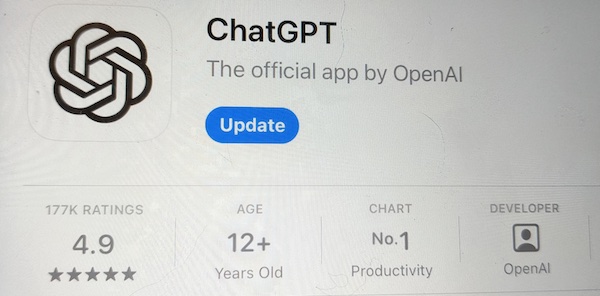
Anthropic's Claude is another powerful independent tool at the moment. On App Stores or on web at claude.ai/
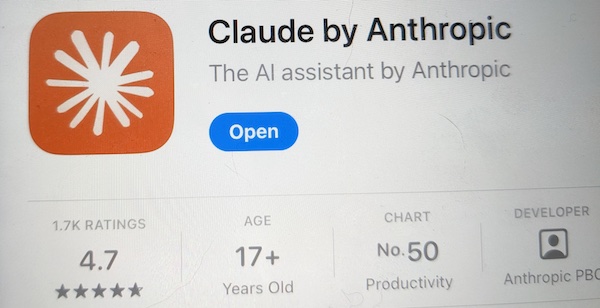
Perplexity AI's tool is particularly valued by those who want all facts backed by references they can check. On App Stores or on web at perplexity.ai/
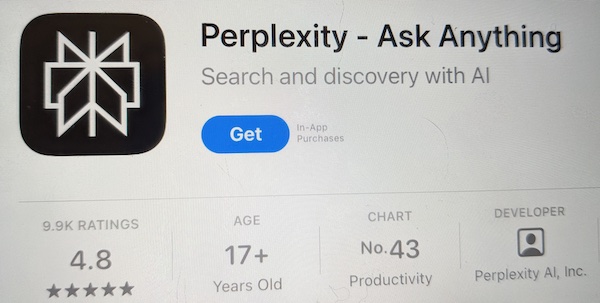
You may also enjoy talking to Hume which sets out to be an AI with empathy: demo.hume.ai/
Remember. If you use a free AI chat tool then it is probably not as good as the paid version from the same supplier, which itself is not as good as the unreleased version they have nearly completed inhouse.
A. Useful things to do with an 'AI Chat' tool
In a later section below we will look at the different ways AI Chat is delivered, for example text, voice and through wearable devices
Here we mostly used one AI Chat tool, Chat GPT from OpenAI to ask a series of questions to see a little of what is possible (March 2024). Note that more recently (June 2024) we have found Claude AI an excellent way to try a free tool.
A1. AI for gardening advice
Simple questions like this show just a fraction of what AI can offer.

Or you can even enter an image and a question like this.
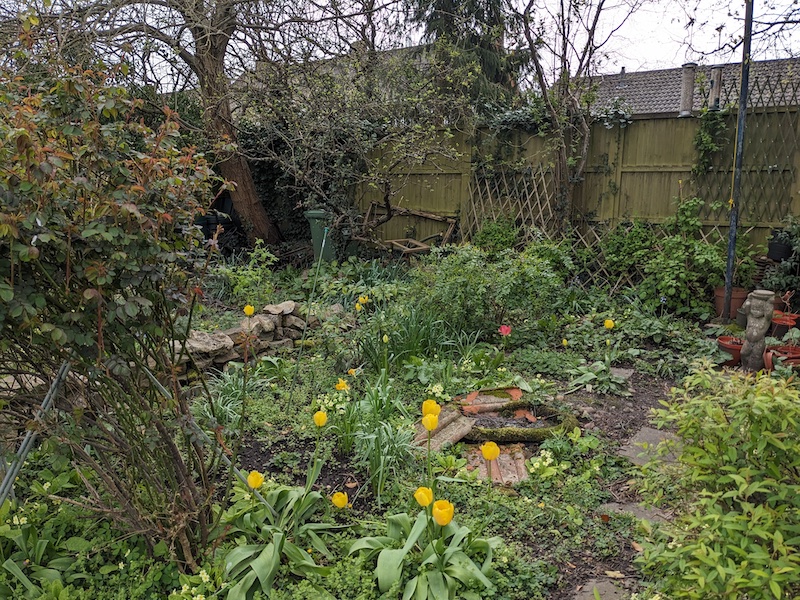
Prompt: "As an expert gardener please describe all plants and trees you see in this image." The answer is not given here but it is quite long and detailed. Do try this with your garden, if you have one.
A2. AI for exercise advice
You can ask AI to be your coach.

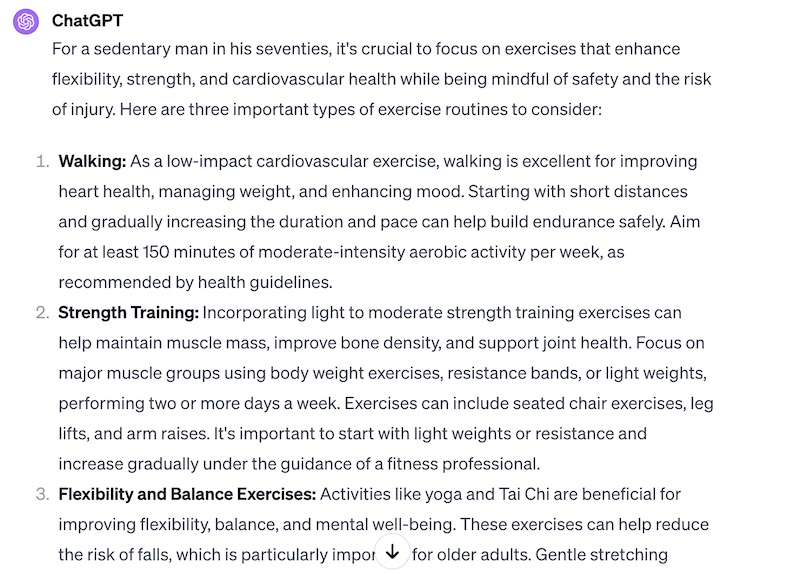
A3. AI for learning a language
See how easily AI switches between languages. Better still, you can interact with some AIs like ChatGPT with spoken voice, so they become just like a personal language tutor.
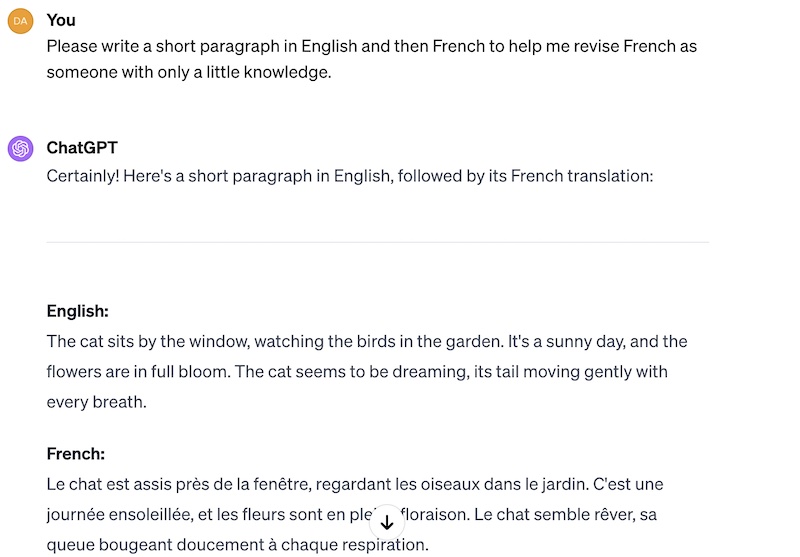
A4. AI for complaining politely
If you know in outline what you want to say, AI will do the rest.

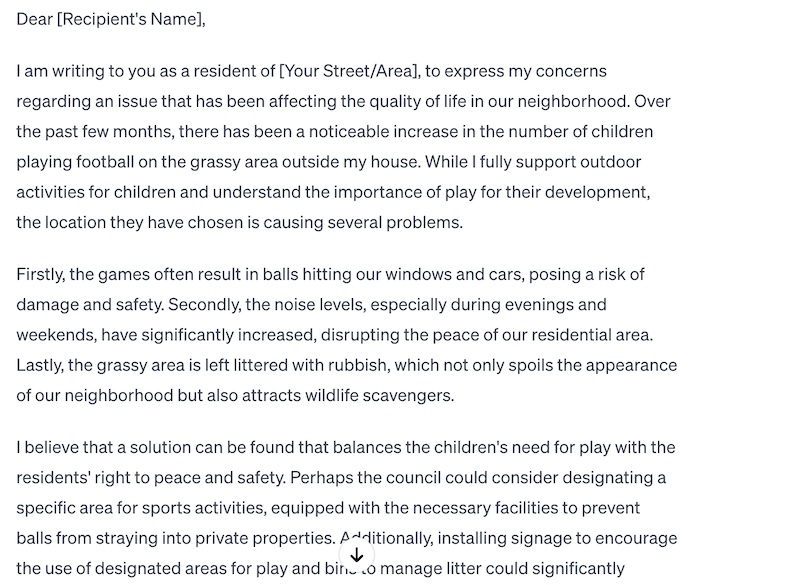
A5. AI as a do-it-yourself advisor
Whatever the problem, AI has a suggestion.
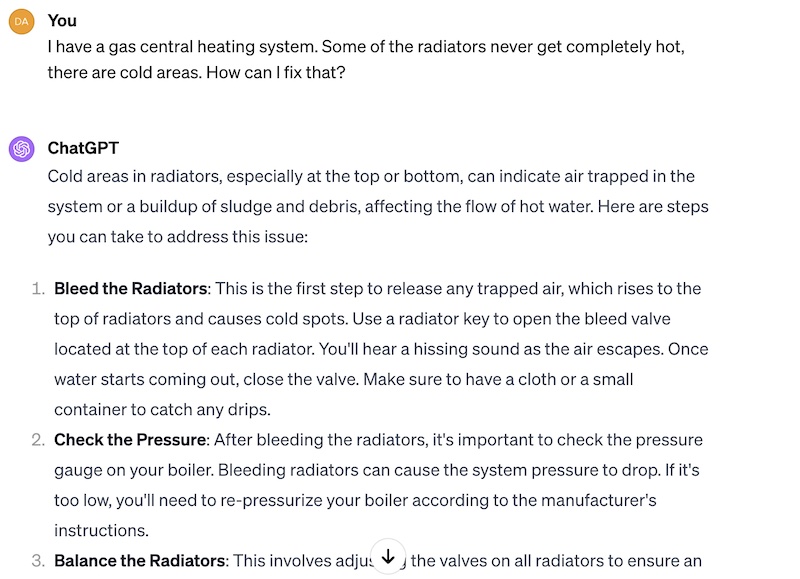
A6. AI for crosswords and puzzles
Whenever you get stuck, AI is worth asking.

A7. AI for inspiration
AI is great at finding the right words.
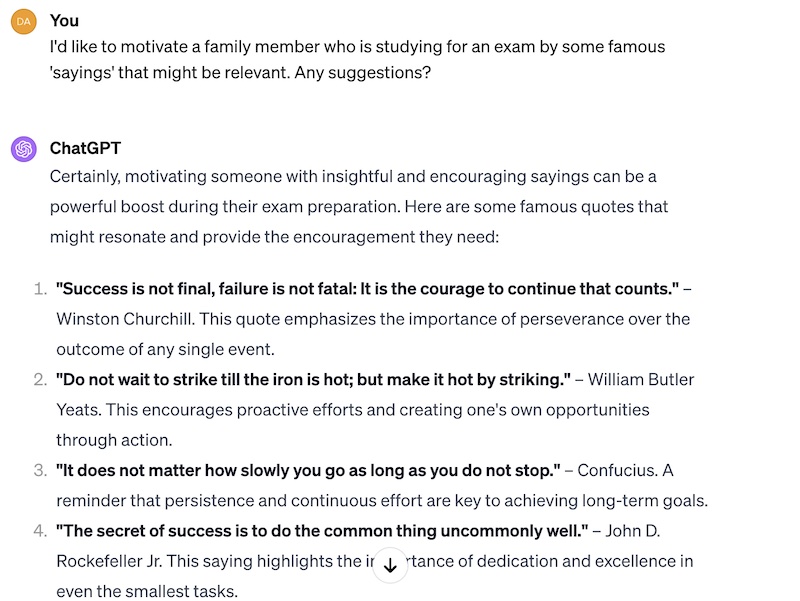
A8. AI for medical advice
You need to be particularly careful with this one obviously. Nevertheless, AI can be helpful in filling that space where a problem is not bad enough to go immediately to the Doctor but it still needs thinking about.
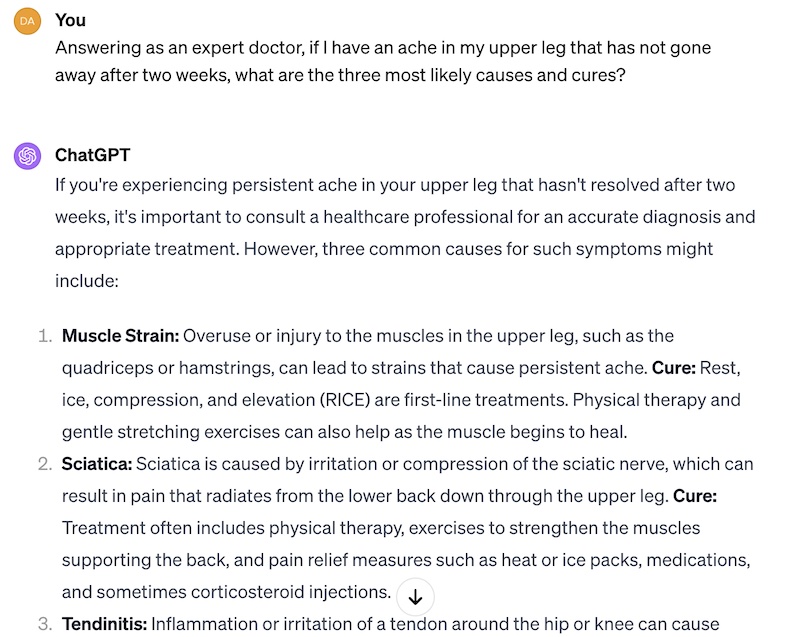
A9. AI for travel
Wherever you are going, AI has already been there.
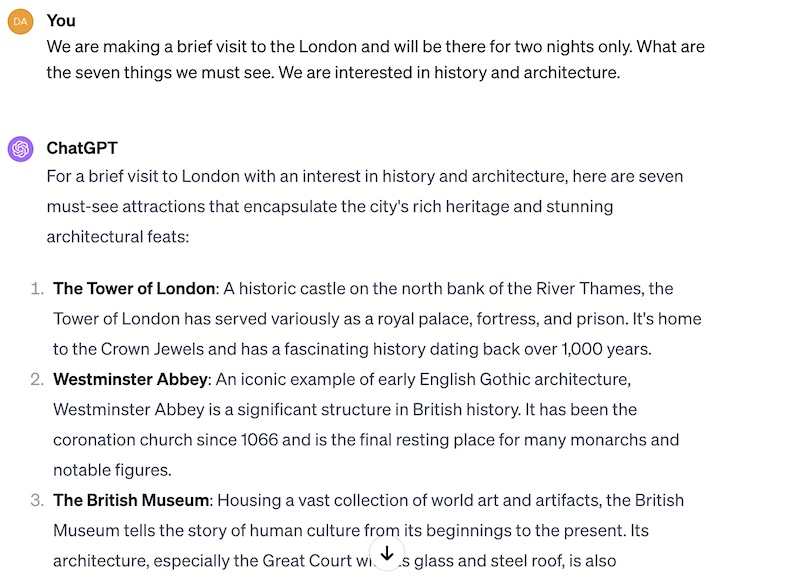
A10. AI for research
Need an answer to the question that has been bothering you?
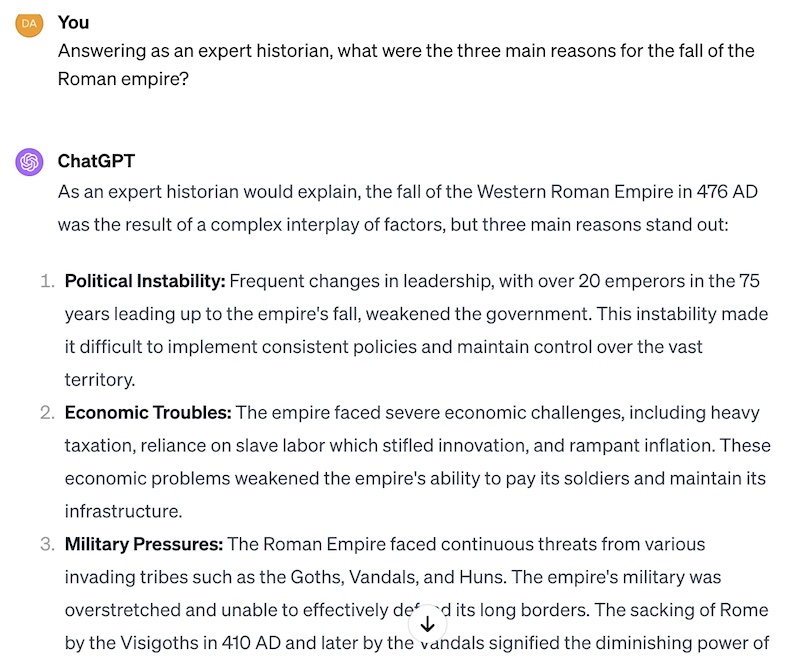
A11. AI for quick legal advice
Need somewhere to start on how to deal with that annoying legal problem? You should always double check anything AI says but it can often provide a useful reference or law for you then to go online and examine.

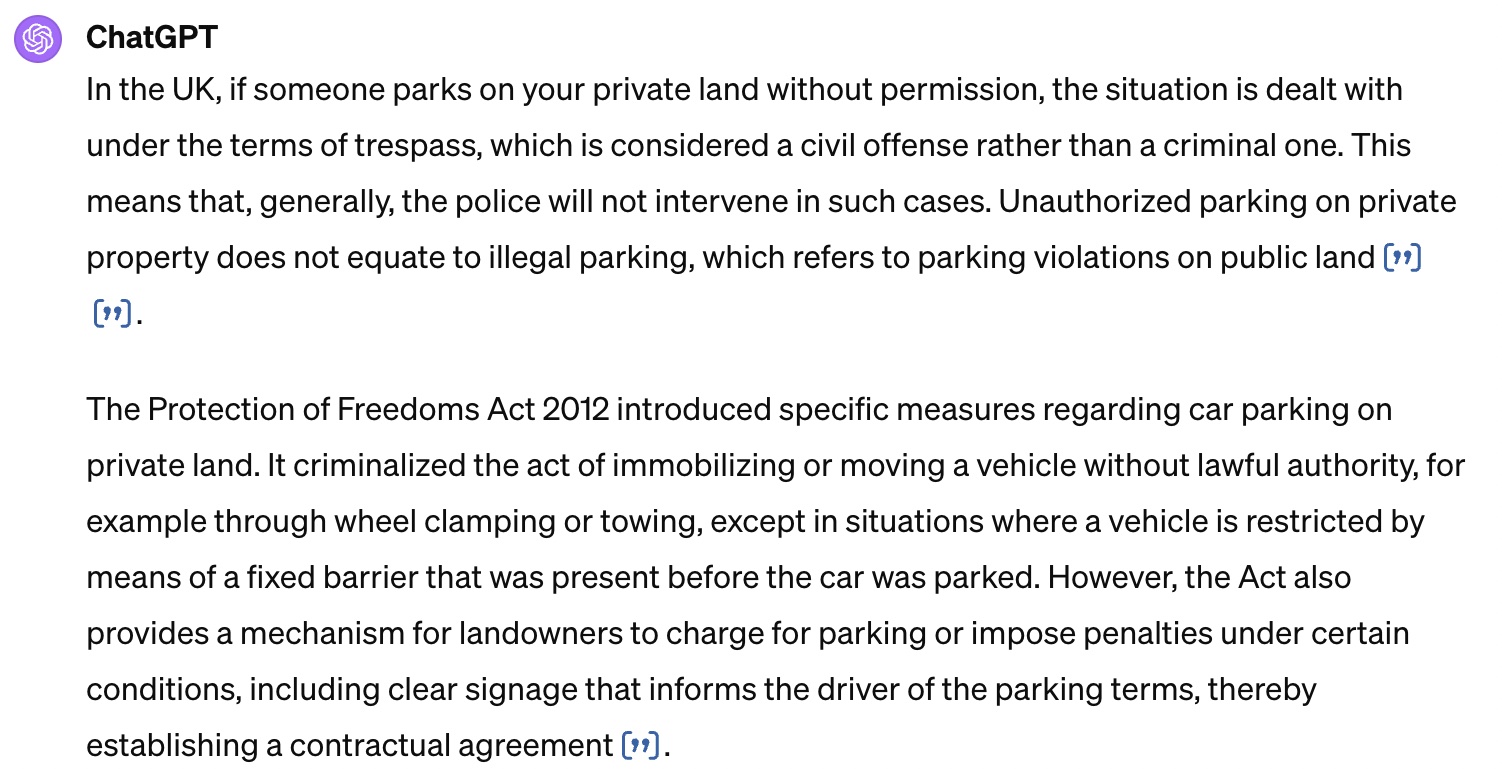
A12. AI for technical support
Not only does AI start with a very broad grasp of all things technical and scientific, it can go online in a few seconds and research anything you need. If you were trying to do this yourself with a traditional search engine, you would still be looking at the search results and trying to wade through the adverts when the AI has already summarised them. Of course, always double-check the answers from AI as some answers may be fictional! Note. The information given here has NOT been checked.


A14. AI for creating websites. The Appetite AI website provides recipes for popular main meals when entertaining friends. It took just three days to create with all images coming from Midjourney and all code and research by Claude.AI It shows that AI tools will soon allow completely 'non technical' people to create websites, apps and games simply by describing what they want. Here is another example of a Claude AI created educational game for learning times tables.

A15. AI for anything. Whatever your latest hobby or fad! Here it is growing lentil seeds to sprouts.
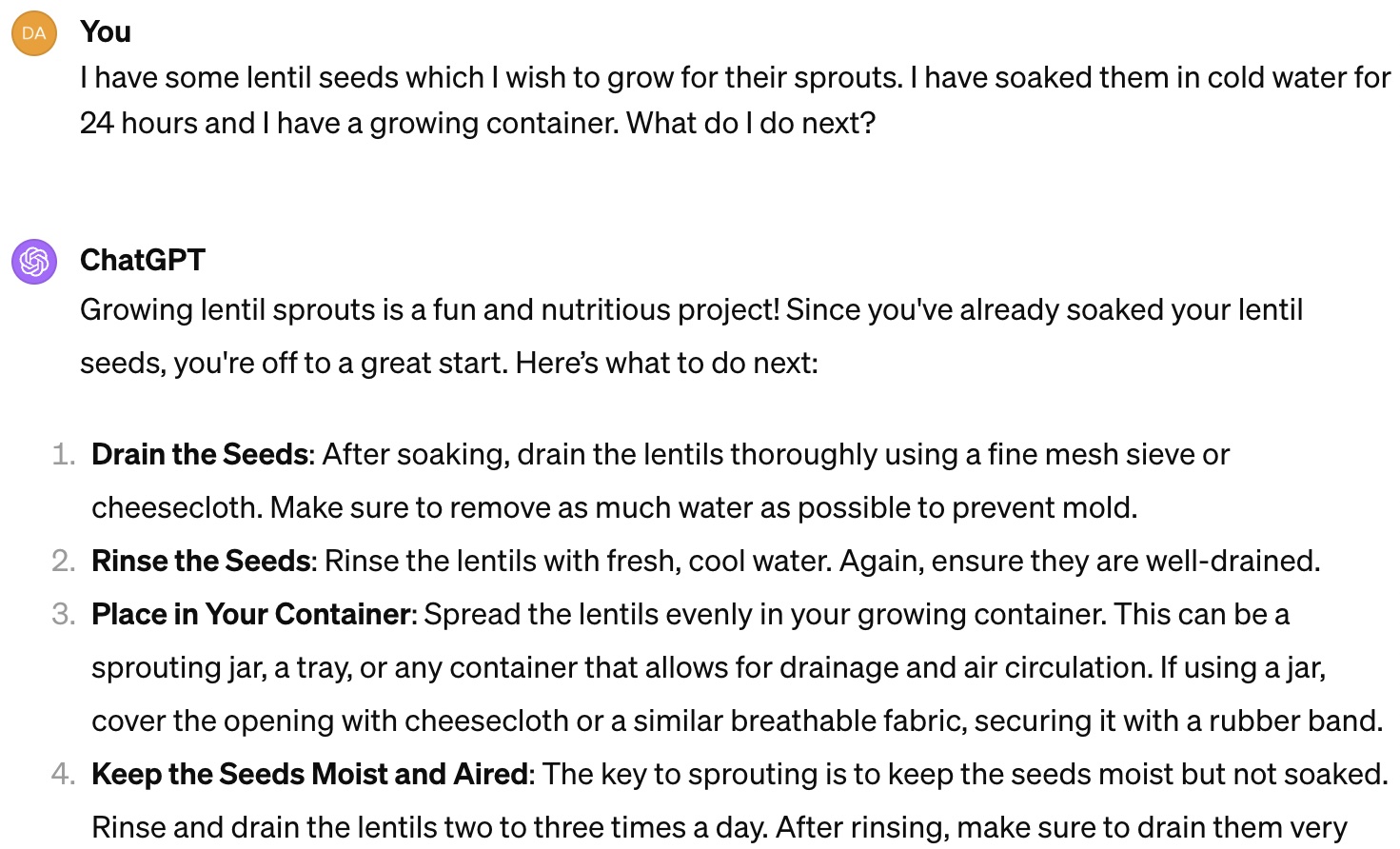
B. The ways that 'AI Chat' tools are accessed.
For most people their main experience of using AI Chat (also called AI Conversation) tools is in one of three ways:
a. Customer support systems, either online or by phone.
b. Home devices like the Amazon Alexa
c. On phone helpers
There will shortly be AI Assistants in every aspect of life, and these will be interacted with in many ways.
B1. Chatbots becoming multi-modal (text, voice, image, video).
Most AI Chat tools on computer, tablet or phone now allow you to not only type in a question but to also add a photo or document. Soon however an AI chat tool will be using its device camera to permanently capture video of what is happening around, and understanding it fully.
Voice First. This means that everything about how you interact with technology is transforming. Increasingly you will use voice to interact with your phone and computer, which will talk back to you. This means that many existing 'apps' and websites will no longer have a meaningful function.
B2. AI Wearables
The concept of 'A wearable' is an item that is carried on your body, whether part of your clothes, as jewelry, as a headset. It has strong AI and contains one or more cameras, a microphone and speakers as well as other sensors. Sometimes it has intelligence 'onboard' and at other times it works through a cloud connection to intelligence.
In some cases the 'wearable' has very comprehensive capability. Others are simple 'AI Assistants' doing things like search and navigation. Some simply record the wearer's life for later analysis. There are a few examples below, but first an example of the dangerous future we now enter.
This is what happens when you connect an AI tool to some 'smart-glasses' and common software tools.
I went to Amsterdam's financial district to demonstrate how unsettling facial recognition software can be. For a segment on Dutch TV show Eva, we wanted to show how simple the technology has become, especially when combined with smart glasses. Just a few seconds of video during a… pic.twitter.com/eDxQ2XG3FO
— Alexander Klöpping (@AlexanderNL) November 20, 2024
Humane's AI Pin
A small device that could be pinned to your jacket, with cloud AI and camera etc. Believed that it has not sold in the volumes the founders hoped for.
Meta's Smart Glasses
Designer prescription glasses with built in camera and audio etc as well as Cloud AI. Most people clearly would be unaware that you are fully equipped to record anything you want! Available from all good stores such as John Lewis from £ 299 (June 2024)
The Rabbit R1
Square red device with camera, audio, Cloud AI. Promised interesting ability to interface with websites for you and more, but has not yet lived up to its initial promise.
Limitless
Small device on pendant that can record your interactions including analysing who is speaking and summarise them for you.
C. Prompting.
This is where it is useful to discuss how creating more careful prompts can improve the performance of AI tools. Also how to recognise when a chat tool is being 'lazy' and how to overcome that. Finally, a good reason to be polite to your chat tools.
_ _ _ _ _ _ _ _ _ _ _ _ _ _ _ _ _ _ _ _ _ _ _ _ _ _ _
Future discussions. In Session 4 we look in detail at some additional things chat tools are useful for, including writing fiction and for more formal writing tasks etc. We also look at some of the ways such tools are created and what that tells us about how to use them.